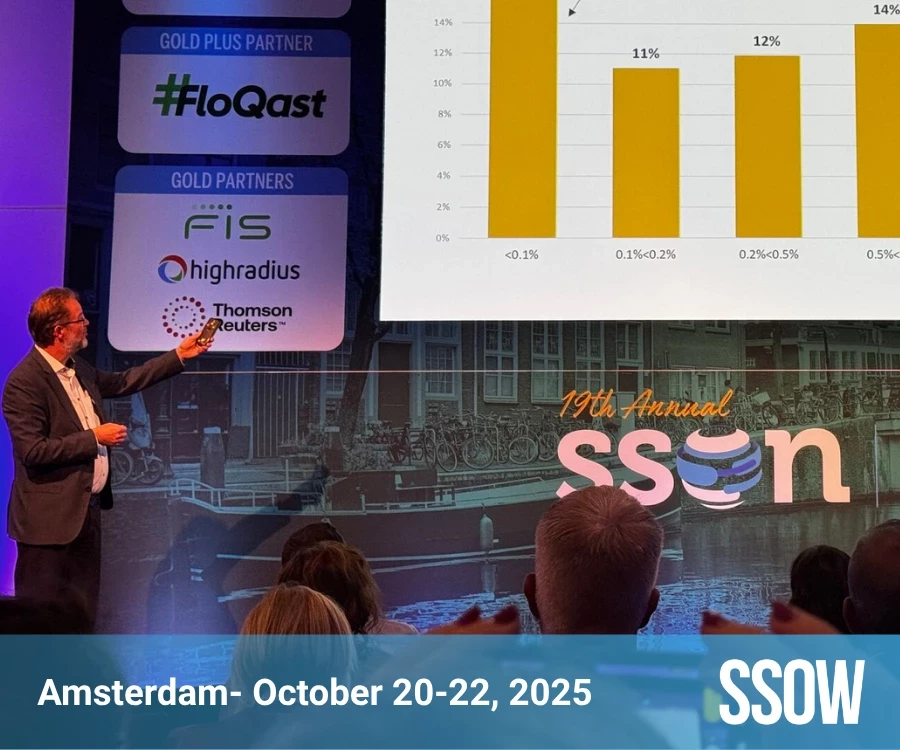Global Shared Services – a Risk Strategy?
Add bookmarkUnisys moved to global accounting services in quest of improving cost structure and to continue to build a global footprint to provide value-add customer services in finance. Its success is encouraging other processes.
Whilst some might see globalization as a risky strategy for some areas of their business – such as perhaps for core accounting services – Unisys has successfully implemented a truly global accounting model, utilizing their shared services center in Bangalore, India and small pockets of core subject matter experts in satellite regional centers close to the customer. Many start thinking of "global" with simpler, repetitive types of transactions.
We jumped straight in with the heavier-hitting accounting stuff! But at no time, did we doubt this was going to be anything other than a success. By ensuring good management practices and a strong focus on internal controls, this model is operating very effectively and efficiently, and provides a clear example of why global services, even from an offshore location, should not pose any greater or additional risk to the business.
Background to Unisys global accounting shared services
In mid 2005, Unisys was already operating successful regional shared services centers around the globe, providing many financial services – including core accounting activity – such as journal processing, closing the books, and balance sheet reconciliation. Indeed, Unisys had already taken its first stepsto globalized services several years earlier, running the global accounts payable and global order management processing out of a single location, in Bismarck, North Dakota. We decided to review what we could do with accounting for maximum leverage.
We agreed to utilize our facility in Bangalore, India that had just been established for core business services such as IT services and delivery. The SSC was one of the first tenants in the new Bangalore building and we subsequently started to build an accounting footprint, region by region, process by process. In doing so, we set the foundation stone for others to follow. The new SSC was to be the production center for global accounting. A small handful of experienced regional "front desk" accountants remained in the regional centers, close to the business, and worked closely with Bangalore’s SSC to ensure quality, and to deliver effective service delivery to the customer: the country finance director in each geography.
With a strong focus on documentation, knowledge transfer, training, site support, a skilled – albeit smaller – retained organization in the regions, and support from leadership in terms of globalization being a key corporate strategy, Unisys ensured that the lifting and shifting of work from regional locations to the new global center, was done in a controlled manner, minimizing any knock on effect or visibility to our customers. Initially this move to a global sharedservices platform was done for labor arbitrage and cost saving purposes, but over time it became evident that there were huge secondary benefits to this new operating model:
- further standardization
- enhanced quality and timeliness
- improved internal controls
- building finance talent pools
- more effective service delivery
- greater customer satisfaction
Shared services employees
One of the things that spurs me on as a leader is the energy I derive from working with passionate individuals of all nationalities, all around the globe. I have such huge admiration for their commitment, focus, dedication and excellent team spirit. The vastly different array of cultures, background, sights, sounds, and colors in our global locations is a pleasure to behold. But we all have one thing in common – we are all proud team members of the shared services family in Unisys. It is always wonderful to see how the teams interact with each other around the globe, to support each other and to work closely in business partnering with our controller finance teams.
With fewer and fewer traditional finance roles around the organization, due to the success of shared services and other global finance initiatives, it is vitally important that we continue to invest and develop our teams and SSC employees. Many of them are the "future of finance," and the SSC is seen as a talent pool and breeding ground for key finance skills and leaders. Bangalore, for example, has proved to be an excellent SSC location to find strong individuals that we can develop and mentor.
By continually looking to increase their scope of responsibilities and opportunities, we provide them with career and skills development opportunities that will stand them in good stead. We look to promote through the organization, and offer opportunities such as working in another country for a period of time, or joining an "audit loop" guest program, where they can further develop their internal controls skills and knowledge. Attention to development and ever more challenging work clearly assists with retention, and helps us maintain minimal levels of attrition, in what is often seen as a challenging marketplace.
As Srisha also confirms, focus on employees and their development is key.
"The rise of shared services and BPO finance has led India to be a hot competitive market, where there is huge competition with the deliverables and quality – I mean to say deliverables delivered in less time and at high quality, with low cost. It’s imperative we maintain a highly motivated staff, keeping in mind that remuneration, training needs, and a growth oriented approach are key. Visibility of leadership is also key to the success of the business, and motivates our employees. As with any organization, it is important to be seen – simply having management located half way around the world is no excuse not to reach out to our global teams and employees on a regular basis."
I enjoy our interactive SSC All Hands Meetings at our global locations, and encourage others in the organization, including senior leaders and vice presidents, to visit the sites and interact with the teams. I truly believe we all benefit from this teamwork and interaction, via regular and consistent communication and dialogue.
Running a global shared services organization
Strong management and communication are key to making a global SSO a success. At Unisys, we encourage regular communication between the front desk accountants and their counterparts in Bangalore. Both parties present their deliverables to the customer together on regular basis. They work as a truly global team. In achieving this, strong controls and governance are important. Specifically, we have focused on:
- attention to internal controls including Sarbanes Oxley (SOX)
- a sound governance structure framework
For example, for one region, over 90 percent of all balance sheet reconciliations are now performed out of the Bangalore SSC. Hence, it is of vital importance that we have a strong system of internal controls and checks, as well as review, sign off and approval from the controller’s organization, to ensure all accounting requirements are constantly and consistently achieved.
"Risk of loss of internal control" is a reason I often hear from companies as to why they would be reluctant to move key processes to a global location. "Nonsense," I retort! If you can do something locally, then there is absolutely no reason that the same level of control – in fact, vastly improved through centralization and standardization – cannot be achieved from your global location. There is no greater risk associated with global services. Some may call us "risk junkies," but I see our calculated risk management as nothing more than strong management.
Customer service
Given our far-flung customers – from Peru to the Philippines, and from Sweden to South Africa – developing the right focus on customer service, including delivery and satisfaction, is key. Whilst certain global customers may have differentiated needs, a standardized approach to addressing these needs is required.
At Unisys, we have recently enhanced or developed a number of new processes, to ensure all our teams are simultaneously focused on the required aligned goals:
- 90 day objective plans by region and geography
- statements of works (SOWs)
- service level agreements (SLAs)
- regular metrics and KPI reporting
- regular customer satisfaction surveys
- enhanced SSC website and self service portal
- standardization of processes
- continuous improvement methodologies, including lean
- regular SSC governance meetings with regional and global management
A sound customer service culture is a key priority for Srisha’s Bangalore team, as he explains:
"Customers have diverse needs as they are from all parts of the world. As a shared services center we must align ourselves to their needs, whether involving work processes or legal factors. Working towards a common goal and aligning ourselves to our customers’ needs goes a long way to attaining total customer satisfaction and encourages a more cordial environment leading to improved processes and one team motto."
Future potential of a globalization strategy
Shared services never stays still. It’s what keeps me on my toes. Having witnessed the success of the global accounting model, we have already located many other global processes into India, such as customer account administration for reference data; cash application; intercompany; etc. But we are not stopping there. We are currently migrating additional procure-to-pay (P2P) and order-to-cash (OTC) processing into the global footprint, leveraging our successful near-shore front desks and offshore SSC teams. This will ensure additional value-add to our customers, as well as significant benefit to our cost structure and controls.
Almost any finance process you can imagine should be able to be run out of, and controlled from, a global location. We are about to embark on moving our indirect taxation production and control checks into our global operation. Whilst many would consider this an obvious choice to maintaining locally or regionally, we believe in the success of this strategy based on streamlining and standardizing as much of the process as you can. Remember, strong management with attention on controls and governance, ensures sound risk management. The world is a huge market – and we intend to exploit it!
About the Authors
Chris Gunning joined Unisys in 1997, initially in an internal audit role within the European team, before moving to South and Latin America for two years, where he ran the audit management services department for the region. He has since relocated to Amsterdam, Netherlands where, after a period as European accounting manager in the SSC, he took a role as director of European shared services, leading an organization of what once peaked at over 300 employees, located primarily in Amsterdam but also across 20 European countries. Gunning has successfully negotiated a series of reductions in force and reorganizations in Europe with the local works councils and trade unions. In the last 24 months, he has developed the new single global accounting model for Unisys. In addition to his current European role, Gunning is also the director of the Bangalore SSC, which provides back office accounting services and other transactional services to all geographies leveraging significant labor arbitrage and cost reduction for the corporation. More recently, the Sydney SSC and remit for Asia Pacific has also been added to his portfolio of responsibility in July 2008. Gunning sits on the Advisory Board for Shared Services News.
Srisha Kanakapura Sathyadharma is a postgraduate of commerce from Karnataka University and is pursing his final year MBA. He has been managing the Unisys Bangalore shared services finance function from its inception in May 2005. Bangalore SSC started with a humble five-person headcount and stands at about 70+ headcount at present. Sathyadharma’s previous tenure was with Hewlett Packard and IBM.
SSN






























